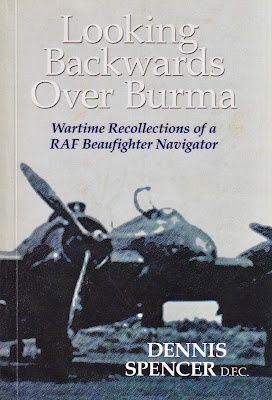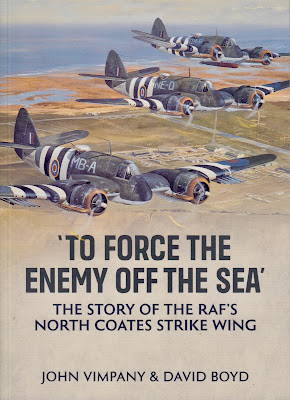Like this simple 192-page paperback from Woodfield Publishing, I’m getting straight into this review. Dennis Spencer was a No 211 Squadron Beaufighter navigator, flying a tour of operations over Burma, hence the title, with the same pilot he flew...
Like this simple 192-page paperback from Woodfield Publishing, I’m getting straight into this review. Dennis Spencer was a No 211 Squadron Beaufighter navigator, flying a tour of operations over Burma, hence the title, with the same pilot he flew the ferry flight from the UK with. As expected, their bond was strong and the book is simply dedicated ‘for Geoff’ (Vardigans).
It took them 20 days to reach India (Allahabad), slowed by two spare parts delays, and then almost the same again for the author to reach Calcutta, his pilot having been admitted to hospital. The account of their journey to this point reads almost like a travelogue, once the ferry flight from the UK is underway, the author proving exquisitely observant (something that becomes exceptionally useful, both for intelligence officer and reader alike, during his tour) with good descriptions of weather, terrain and people.
Dennis is also particularly good at an almost overwhelming dose of self-doubt. He is consistently worried about his ability and skill as a navigator and, in general, a serviceman. This is evident early on before he flies on ops. Having to travel to Bhatpara (East Bengal, now Bangladesh, just north-east of where the Ganges flows into a major distributary, the Padma River) on his own, despite travel warrants and the like, is daunting. Indeed, this chapter is titled ‘Lonely Journey in a Foreign Land’. His uncertainty is further assaulted by the ‘seething mass of humanity’ he encounters and the general culture shock of experiencing India, both familiar and unfamiliar at the same time. Dennis is eventually warmly welcomed to the squadron, having travelled by Dakota, train, river steamer and truck to get there, and takes up residence on a ‘dead man’s bed’, a fact his new basha mate tries to hide (the standard coping mechanism for most aircrew).
Flying his first op six days later (this is March/April 1944 so the time of Kohima and Imphal) across the Irrawaddy with a ‘mad’ Canadian who felt he did not need a navigator, the author, having been told by his colleagues that map reading was of far more use than keeping an accurate plot, experiences a rollercoaster of emotions as he feels compassion for the Burmese they scare the living daylights out of at low level and then burning hatred for enemy soldiers who try to man an anti-aircraft gun. The realisation sinks in – ‘For me this was the day the war had really started.’
Pilot and navigator were reunited soon after as, by mid-May, Geoff and Dennis were approaching double figures for ops flown. Their tour progresses through to early December, with a few adventures on the way as you would expect, both men earning the DFC as a result and the author starting a rest tour with a Mosquito Conversion Unit near Bangalore; he also casually mentions he’s there as the navigation officer so any doubts about his abilities were clearly all in his head! If you’ve read anything about low-level work over Burma, you’ll be familiar with how these strikes were carried out and how the environment – the terrain and the weather – were as dangerous as the Japanese. What stands out, however, is the author’s description of the flying, the attacks and the sheer effort just to get home. Coupled with his memories of squadron life and life in India, the narrative is on par with Andrew Millar’s The Flying Hours and Atholl Sutherland Brown’s Silently into the Midst of Things in terms of painting a colourful, harrowing, debilitating, and even fragrant picture of the aircrew experience over Burma. The downtime between ops is exacerbated by Dennis being very good at worrying when he has nothing to do. His ‘expanded Inner Self awareness’ means he knows he lets his mind run; these internalisations – the fear, overcoming it, etc. – receive as much weight on the page as the flying.
Lightly illustrated, a small bibliography is included, as are some small, useful appendices. While very much a descriptive account of the ‘highlights’ or, at least, what he could remember – there are a few dates and aircraft/technical details mentioned, but their paucity hardly registers given the rich narrative – a lot is learned about Dennis and, to a lesser extent, Geoff, his pilot. To do so in less than 200 pages is something special. This is the ideal aircrew memoir.
*Dennis Spencer passed away in September 2020.













